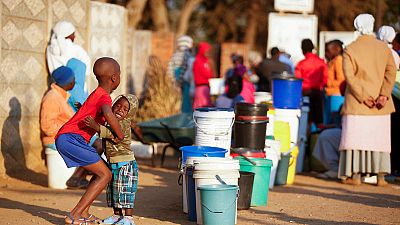
HARARE, Dec 6 (NNN-XINHUA) — Zimbabwe’s capital city Harare has shut down a water treatment plant because of depleted water supply in reservoirs, the Harare City Council announced, as an El Nino-induced drought has swept the African country, drying up many dams.
The Prince Edward Water Treatment Plant, the smaller one of the capital’s two water treatment plants, was shut down on Saturday “as a result of depleted raw water in the supply dams of Harava and Seke” which are “at 13.7 percent and 13.5 percent full,” said the council, adding that the water level in Seke is now below the abstraction level.
Most of the city’s southern suburbs which are supplied directly from the plant have been affected by the shutdown, it said.
The two dams of Harava and Seke are the major reservoirs for Harare and their water is mainly treated at the Morton Jaffray Water Treatment Works. However, the city and its dormitory towns of Chitungwiza, Norton and Ruwa have been experiencing water shortages because of continuous breakdowns at the major treatment plant.
The shutdown at the Prince Edward Water Treatment Plant comes at a time when the city is grappling with a cholera outbreak which has so far left 13 people dead in Harare and Chitungwiza, according to figures from the Ministry of Health and Child Care.
The transmission of acute diarrheal infection is closely linked to inadequate access to clean water and sanitation facilities, according to the World Health Organization (WHO).
The WHO on Tuesday donated an assortment of goods and medicines to Zimbabwe to help with its cholera fight.
Handing the consignment to Zimbabwean Health and Child Care Minister Douglas Mombeshora, WHO Regional Director for Africa Matshidiso Moeti expressed the WHO’s “desire” to end the outbreak with the essential medicines and diagnostic kits needed before “the Christmas mass movement of people begins.”
“We all have to redouble our efforts, mobilize the community, and move them to treatment centers, so they get treatment which saves lives,” Moeti said.
“This epidemic has to come to an end as soon as possible,” said Mombeshora, noting, “This donation is going to make a huge impact.”
The water crisis that hampered the cholera fight in Harare’s high-density suburb of Kuwadzana, epicenter of the outbreak, has been addressed, he added.
According to the Ministry of Health and Child Care, Zimbabwe had recorded a cumulative 9,895 suspected cholera cases as of Nov. 30, with 9,466 recoveries and 53 confirmed deaths. — NNN-XINHUA
